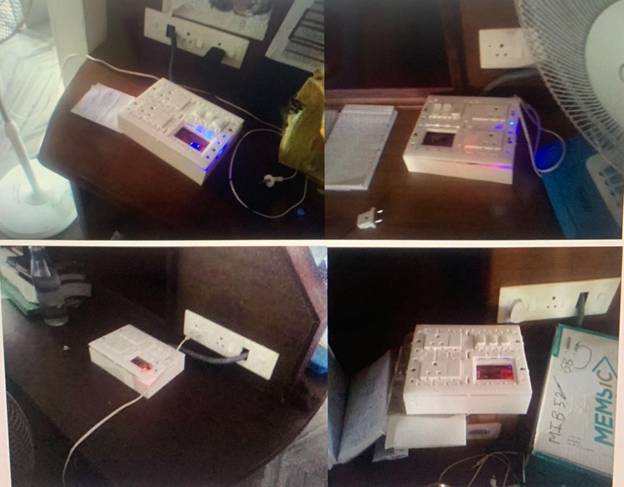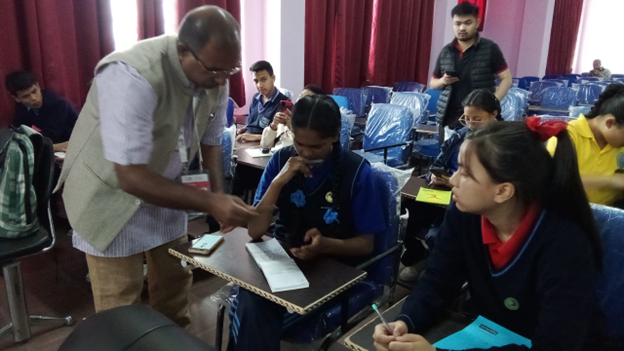Low carbon energy tracking
One of the First Universities in India to Record Campus Carbon Footprint in real-time
In the era of Sustainable Development Goals (SDGs) and global discussions such as COP28, understanding and managing carbon footprints is becoming increasingly crucial. Amrita University has taken a significant step forward in this mission, becoming one of the first universities in India to record and monitor its campus carbon footprint.
At Amrita, students don’t just learn about carbon footprints in theory — they experience it firsthand. Through state-of-the-art technology, every building on campus is equipped with real-time carbon footprint dashboards. These dashboards allow students to visualize the environmental impact of their activities, whether in classrooms, laboratories, or other campus spaces.
This initiative ensures that students can:
Below is an example of one such dashboard, which provides a detailed carbon footprint report for a building.
SREE Campus Dashboard for tracking Carbon Emissions on Campus
Amrita University has developed SREE Campus, an advanced Sustainability and Resilience Monitoring Dashboard, to track and manage key environmental metrics across its campuses. The platform provides real-time data on critical areas such as energy efficiency, climate conditions, and carbon emissions, enabling optimized resource management and fostering environmental stewardship. By integrating data from multiple sources, EcoSphere offers a holistic view of campus sustainability, facilitating data-driven decision-making to address resource inefficiencies and promote sustainable practices. This dashboard is central to the university’s mission of achieving goals like carbon neutrality.

Beyond its practical applications, EcoSphere serves as an educational and research tool, engaging students and faculty in real-world sustainability challenges. It fosters awareness by showcasing the university’s progress and highlighting areas for improvement, inspiring collective action within the community. As a replicable framework for sustainable campuses worldwide, EcoSphere embodies Amrita University’s commitment to “Compassion-Driven Research,” addressing global environmental challenges and setting a benchmark for sustainable development in higher education institutions.


Dashboard Image Caption:
The carbon footprint dashboard shows real-time data for building activities.

Student Interaction Caption:
Students viewing and engaging with carbon footprint data, promoting environmental awareness.

Transitioning to Renewable Energy
Amrita University has successfully integrated renewable energy technologies into campus operations, with solar panel installations across multiple campuses now contributing substantially to our energy needs.

Empowering Communities Through Sustainable Development Training
Amrita University, in collaboration with the UNESCO Chair on Experiential Learning for Sustainable Innovation and Development, has been conducting impactful educational programs to address climate action and resilience. These initiatives focus on empowering communities and educational institutions by providing tools, knowledge, and frameworks for sustainable development and disaster resilience.
Multi-Level Training Sessions
The Civil 20 India Working Group on Sustainable and Resilient Communities, along with the UNESCO Chair, organized multiple parallel training sessions on topics such as Sustainable Development, Disaster Resilience, and Energy Literacy. These programs were attended by over 200 participants, ranging from school students to university faculties, and concluded with certificates awarded to all participants.
Disaster Resilience Training in Sikkim
A two-day certificate training workshop on Disaster Resilience was conducted in Gangtok, Sikkim. This initiative was organized by the UNESCO Chair in collaboration with:
The workshop had 85 participants from institutions like Nar Bahadur Bhandari Government College (55), Deorali Government Girls’ Senior Secondary School (15), and Tadong Senior Secondary School (15). The training focused on building civilian and community resilience against disasters.
Sustainable Development Training Workshop
A two-day Sustainable Development: Concepts, Frameworks, and Tools, training session was conducted at Janata Bhavan Hall in Gangtok. The workshop covered topics such as:
A total of 34 teachers from prominent schools such as Modern Senior Secondary School, West Point Senior Secondary School, and Sir Tashi Namgyal Senior Secondary School participated. These teachers represented various disciplines, including Science, Mathematics, Environmental Studies, and Social Studies.
Key Outcome: One of the participants, Mrs. Ranjana Lama (TGT, Arts) from Modern Senior Secondary School, conducted an awareness session on Sustainable Development for her school, emphasizing the need for lifestyle changes to promote sustainability.
Certificates and Recognition
Certificates of completion were awarded to all participants by the UNESCO Chair on Experiential Learning for Sustainable Innovation & Development and the Secretary of the Land Revenue and Disaster Management Department, Government of Sikkim. These programs have inspired local leaders and educators to drive change within their communities.






Strengthening Research Integration and Collaborations
Our local education programs are now closely tied to ongoing climate research projects. This includes integrating research findings on disaster resilience, energy literacy, and participatory sustainability assessments into our training workshops, providing participants with cutting-edge, research-backed knowledge.
We are expanding our partnerships to include industries, NGOs, and international organizations. These collaborations will help scale our education programs and allow us to deliver more comprehensive and impactful sessions. For instance, we are now working with global experts to integrate climate adaptation technologies into our workshops.